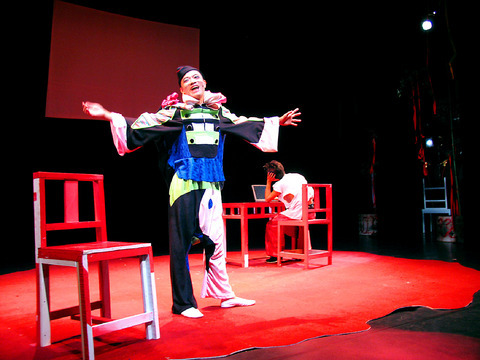The New Idea Theater Festival began last night at the National Theater of the CKS Memorial Hall with the first of three pieces by Taiwan's leading experimental theater troupes. Performances run tonight through June 5, in Chinese and Taiwanese.
Putting arguably the festival's best foot forward is one of Taiwan's more established experimental troupes, Golden Bough Theater (
It has given free reign to their players to script three vignettes that focus on friendship, love and death and the result is an evening of surprisingly mature and cohesive theater. This is experimental, and it works.

PHOTO: DAVID MOMPHARD, TAIPEI TIMES
Stage veteran Wu Peng-feng (
Meetai, in his scene, gives a memorable performance as a Hindu devotee who encounters a god. His musical use of Hindi overcomes what might otherwise be a language barrier.
In the decade since it was founded, Golden Bough Theater has made a name for itself by performing everywhere from formal theaters to small-town night markets throughout Taiwan. Their style is marked by a fusion of modern theater elements with traditional Taiwanese opera.
Audiences who caught Golden Bough players performing My Dinner with Shakespeare last month will recognize the troupe's preferred modus operandi in All in One; a series of scenes with a joining theme that are both far out and grounded in reality.
The coming two weekends will see another two of Taiwan's experimental troupes tread the boards. Xitian Society Musical Workshop (
2:30pm matinee on Sunday. Portrait of Love has similar showings next Thursday, May 26 through May 29 and Who is Planning a Scheme will run June 3 to June 5 at 7:30pm, with matinees on Saturday, June 4 and Sunday, June 5 at 2:30. All performances are at the Experimental Theater of the National Theater (國家戲劇院實驗劇場), 21-1, Zhongshan S Rd, Taipei (台北市中山南路21-1號). Tickets for each performance are NT$400 or NT$960 for all three and available at the CKS Cultural Center or on the Web at www.artsticket.com.tw. For more information, call (02) 3393 9888.

April 14 to April 20 In March 1947, Sising Katadrepan urged the government to drop the “high mountain people” (高山族) designation for Indigenous Taiwanese and refer to them as “Taiwan people” (台灣族). He considered the term derogatory, arguing that it made them sound like animals. The Taiwan Provincial Government agreed to stop using the term, stating that Indigenous Taiwanese suffered all sorts of discrimination and oppression under the Japanese and were forced to live in the mountains as outsiders to society. Now, under the new regime, they would be seen as equals, thus they should be henceforth

Last week, the the National Immigration Agency (NIA) told the legislature that more than 10,000 naturalized Taiwanese citizens from the People’s Republic of China (PRC) risked having their citizenship revoked if they failed to provide proof that they had renounced their Chinese household registration within the next three months. Renunciation is required under the Act Governing Relations Between the People of the Taiwan Area and the Mainland Area (臺灣地區與大陸地區人民關係條例), as amended in 2004, though it was only a legal requirement after 2000. Prior to that, it had been only an administrative requirement since the Nationality Act (國籍法) was established in

With over 80 works on display, this is Louise Bourgeois’ first solo show in Taiwan. Visitors are invited to traverse her world of love and hate, vengeance and acceptance, trauma and reconciliation. Dominating the entrance, the nine-foot-tall Crouching Spider (2003) greets visitors. The creature looms behind the glass facade, symbolic protector and gatekeeper to the intimate journey ahead. Bourgeois, best known for her giant spider sculptures, is one of the most influential artist of the twentieth century. Blending vulnerability and defiance through themes of sexuality, trauma and identity, her work reshaped the landscape of contemporary art with fearless honesty. “People are influenced by

The remains of this Japanese-era trail designed to protect the camphor industry make for a scenic day-hike, a fascinating overnight hike or a challenging multi-day adventure Maolin District (茂林) in Kaohsiung is well known for beautiful roadside scenery, waterfalls, the annual butterfly migration and indigenous culture. A lesser known but worthwhile destination here lies along the very top of the valley: the Liugui Security Path (六龜警備道). This relic of the Japanese era once isolated the Maolin valley from the outside world but now serves to draw tourists in. The path originally ran for about 50km, but not all of this trail is still easily walkable. The nicest section for a simple day hike is the heavily trafficked southern section above Maolin and Wanshan (萬山) villages. Remains of